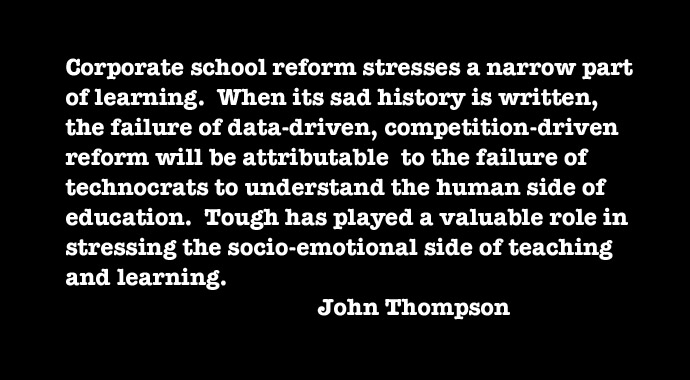Paul Tough Turns Away from Punitive Education Reforms

By John Thompson.
Paul Tough’s Helping Children Succeed is a great corrective to the hubris that undermined the contemporary school reform movement. Tough volunteers a modest statement about his methodology, and in doing so he offers an alternative to corporate reform and its grand vision of “disruptive innovation” to blow up the education “status quo,” in order to produce “transformational” change.
Tough explains that he is a journalist who describes particular interventions, pedagogies, and/or programs that may be representative of larger dynamics. The sensitive use of these human scale case studies, informed by social science research, can provide broader insights into causal relationships in terms of what works in a sustainable manner for entire school systems. This process is similar to what philanthropists and foundations try to do; “They look for programs that work and try to replicate them, scale them up to reach as broad an audience as possible.” One problem has been that “scaling up doesn’t work as well in social service and education as it does in the tech world.”
Tough’s premise “is that no program or school is perfect, but that each successful intervention contains some clues about how and why it works that can inform the rest of the field.” Rather than discover a technocratic silver bullet, his goal is “to extract and explain the core principles of each program I write about and look for common threads running through them.”
Many reformers are dismayed by the meager gains produced by their top-down mandates, and upset by the fervent pushback by educators and patrons that they prompted. Some reformers seem willing to consider new ideas, such as better early education, but others remained determined to double down on their politics of destruction, using mass school closures to break the backs of the teachers’ and unions’ resistance. I didn’t imagine that output-driven reformers will be satisfied with Tough’s failure to articulate a concise accountability regime to replace their commitment to test, sort, reward, and punish, and sure enough, here’s an example.
Even as Tough’s eclecticism and incrementalism will disappoint market-driven reformers, his extremely diplomatic approach to critiquing reform will annoy many teachers. For instance, both sides of our Paul Tough Turns Away from Punitive Education Reforms - Living in Dialogue:
